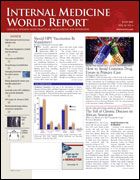Publication
Article
Internal Medicine World Report
High-Volume Energy Drinks Linked to New-Onset Seizures
Author(s):
But More Evidence Needed
BOSTON—Ingestion of energy drinks may provoke seizures in susceptible individuals, according to a small case study presented at the American Academy of Neurology annual meeting.
"While [the study] is attempting to assign a causal relationship between high-volume consumption of energy drinks and new-onset seizures, it should be kept in mind that our study is limited by small sample size and may reflect the possibility of a coincidental association or selective retrospective blame provoked by questioning," said Stanley Jones P. Iyadurai, MD, a neurology resident at Barrow Neurological Institute in Phoenix.
He was quick to add, however, that 2 of the 4 patients in the study volunteered the information about the energy drinks.
The 4 patients presented with seizures on several independent occasions, always in association with the heavy consumption of energy drinks. All patients had experienced abrupt, adult-onset seizure episodes, and none had a personal or a family history of seizures or any history of trauma or illicit-drug use. In all cases, electroencephalography and magnetic resonance imaging were normal.
When the participants drank only small amounts of the energy drinks or stopped drinking them altogether the seizures stopped.
Common ingredients in the energy drinks consumed by the patients that were suspected of causing the seizures were caffeine, taurine, and guarana. Exactly how much of these ingredients needs to be ingested to trigger a seizure is unknown, Dr Iyadurai said. "Given the fact that a large number of young adults consume energy drinks without having seizures, it is likely that these drinks reduce the seizure threshold in a dose-dependent manner and in genetically susceptible individuals."
He added, "Energy drinks are very popular among young people, and advertising targets college students, athletes, and active individuals between 21 and 35 years of age."
Primary care physicians should keep the seizure–energy drink link in mind, especially in relation to younger patients with no seizure history who suddenly have one. "When a seizure occurs for the first time in individuals in one of these subgroups, clinicians might want to consider querying them about their possible ingestion of energy drinks," Dr Iyadurai advised.
Additional research is needed to examine the central nervous system effects and mechanisms of action of these popular stimulants, and how genetic makeup may contribute to susceptibility.
Ingestion of energy drinks has been associated with cerebral vasculopathy acute mania, and even death.





